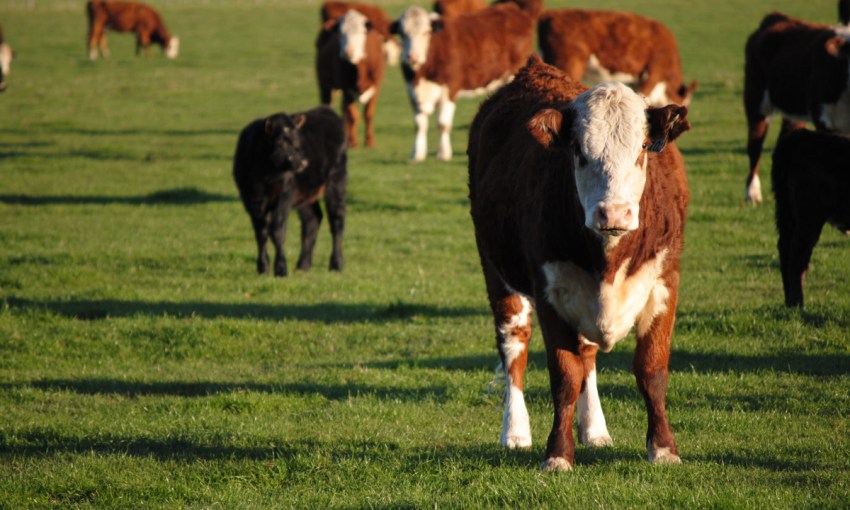Rainfall is high, the underground aquifers abundant and the soil is as fertile as the entrepreneurial spirit in the farming district of Millicent.
South Australian Agricultural Town of the Year finalist: Millicent

This region is not only rich in natural assets but also business acumen: it is home to innovative grain farmers, broad bean and carrot seed export crops, sheep and two of the nation’s leading beef cattle studs.
It is a region rich in agricultural diversity.
In nearby Tantanoola there is a large-scale herb farm employing more than 60 staff including some from Millicent, a successful wild flower farm operates in the region while other producers are breeding free-range pigs and chickens.
Many of those living in the region are employed in forestry while others have jobs at the Blue Lake Dairy Group’s state-of-the-art milk powder packing plant opened in 2015.
At the Millicent civic centre, Wattle Range Council development services director and local business owner Steve Chapple is brimming with enthusiasm for new plans to expand the agricultural job market even further.
He tells of a new canola oil seed processing factory and a cattle feed pellet production facility moving into town.
There are also two reviews underway at the council as it shows leadership in supporting regional growth and value-adding for farmers.
One review is for a new food-processing hub on the outskirts of Millicent and another to explore investing in a new small-scale abattoir.
“In 2014, we were named the number one agriculture production council in Australia by the Regional Australia Institute,” Stephen says of the Millicent and Wattle Range council area.
“When they look at production revenue for size of land and volume coming out here, I understand we’ve been in the top 10 ever since.”
The council reviews aims to keep it that way, with the new small-scale service kill abattoir designed to support growth in niche livestock production in the region.
It is a plan welcomed by farmer Steve Slape who introduced free-range pigs to the family prime beef and lamb farm to see how they would prosper on lighter bracken fern country.
Steve runs one of only a handful of free-range pork farms in the state with his wife Rose, and is now working on the farm full-time rather than as a shearing contractor.
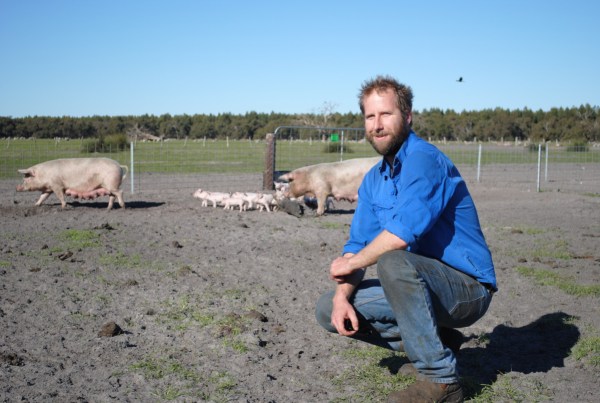
“We’re selling pork into Melbourne and Sydney and looking at some export opportunities to Vietnam,” he says of the business they are currently rebranding from Diamond Springs.
The couple have about 200 sows on the certified free-range operation that produces hormone-free, antibiotic-free pork.
It was four years ago when Steve made the move to increase farm productivity after he confirmed that sows would help to control bracken fern on land unsuitable for grazing sheep and cattle.
The pigs are now successfully controlling broadleaf weeds and onion grass, and are having a positive impact on increasing soil pH, phosphorous levels, and microbial activity.
The couple won the branded meat champion pork award at the Sydney Royal 2018 Fine Food Show last year.
“Now the council’s feasibility study into a micro abattoir, that would be a game-changer for us,” Steve says.
This is a prosperous region where generational family companies are flourishing and employing large numbers of locals.
A few minutes from town, Scott de Bruin runs the famed Mayura Station with its elite, award-winning Wagyu beef cattle operation and on-site restaurant The Tasting Room that showcases its product.
Last year, the restaurant won the 2018 national award in the Savour Restaurant & Catering Industry Association’s Best Steakhouse category.
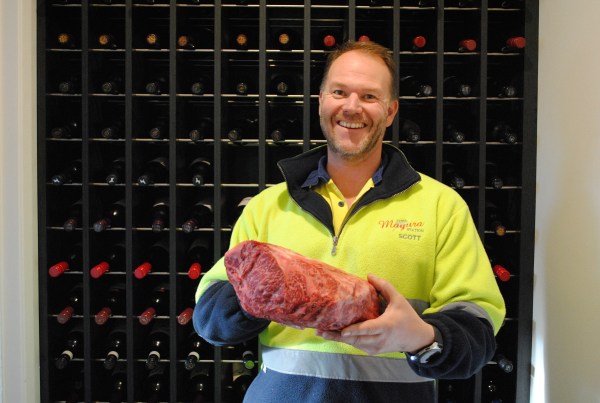
“We got a transportable that was going to be a lunchroom for the guys who work in the feedlot and it was really Dad’s idea to create a tasting area, so we could bring visiting customers into the kitchen,” Scott says.
“Last year when we won best steakhouse in the nation, I was blown away.”
The station was established in 1845, and it was Scott’s father who imported its first full-blood Wagyu cattle from Japan in 1997. In May this year, one of their descendants, a two-year-old heifer, was sold for a record-breaking $280,000.
“The Wagyu breed has a very strict registration process; everything has to be DNA certified so you can be very confident about what you buy,” he says.
The business now employs about 20 local people and about 70 per cent of the product is exported, mainly to Asia and the Middle East.
Scott says the region has plentiful water, fertile soils and a clean environment to breed some of the nation’s best cattle.
Another well-known family business is The Baker Group based around nearby Furner and now one of the largest private diversified agribusiness groups in the region.
The Baker Group owns one of the oldest Simmental beef cattle herds in Australia and also has broadacre cropping, wool and lamb.
It also owns The Banksia Company, a successful Australian native flower production and exporting enterprise.
Dale Baker established the flower farm in 1985 and sales manager Angela Whitehead says it now has about 14 staff and grows about 40 different types of flowers ranging from banksias to proteas.
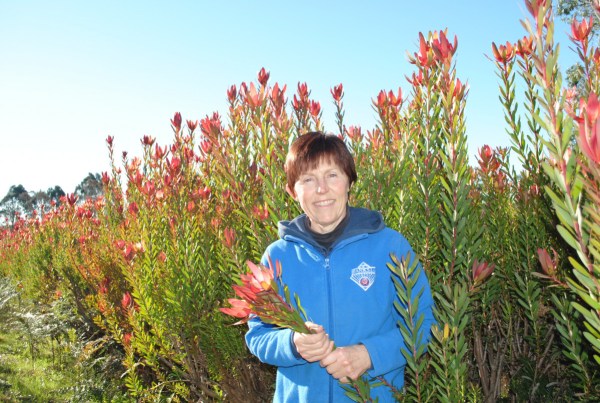
Most are sent to wholesalers in Melbourne, Sydney and Brisbane with the local soil and climate making the farm highly successful in producing beautiful specimens.
“It’s the climate, clean air and water, reliability of water, it’s a good area to live in too,” Angela says.
Another family innovation success story began in Tantanoola in 1991 when a group of family members including Ian Lines and his brother Mark started Holla-fresh herb farm 10km south of Millicent.
“They started off with parsley and at that stage we took it to Woolworths at Millicent and Foster’s Foodland along with She’s Apples in Mount Gambier,” says Ian’s daughter Kimberley, who now oversees the company’s business compliance and development.
One of supermarket giant Woolworths’ head office staff visited town and looked favourably at the herbs for sale and “the rest is history,” Kimberley says.
The group now has numerous growing houses, employs more than 60 staff and semi-trailers filled with basil, parsley, thyme, baby spinach and other hydroponically grown herbs leave the site six days a week to Adelaide and five to Melbourne.
Kimberley and her brother Paul both work in the business and its patented mobile galley system used to grow the herbs in greenhouses has proved so successful their uncle Mark has now created a spin-off fabrication company for its distribution.
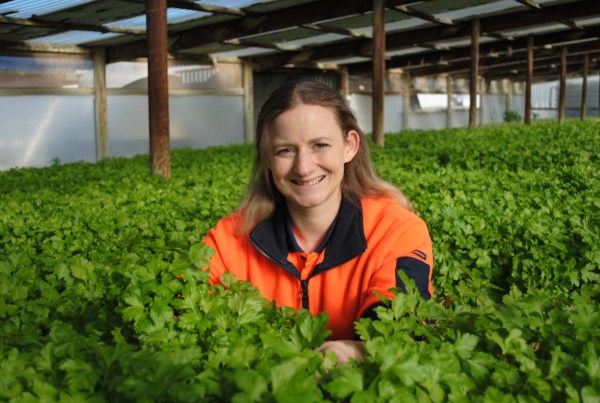
The unique automated growing system is now being fabricated in a separate business in nearby Mount Gambier and the product sold both nationally and overseas.
Kimberley says the business is always looking to improve the way it works and also recently installed a cutting edge carbon negative power generation unit using waste wood chips to heat the site’s largest glasshouse.
“We’re working with Green Industries South Australia and this is the first of its kind operating commercially in Australia,” Kimberley says.
Grain and seed production is another successful industry in the region with farmers growing more than $3 million in seed production value. The area also produces significant amounts of broad beans that are mainly exported to India.
Millicent Business Association chair Lee Morgan, who also heads the South Eastern Water Conservation and Drainage Board, says his association was also working to rejuvenate town shops and businesses.
It has introduced new business awards with the Sebastopol agricultural machinery retail and repair business joining a hall of fame.
He says it’s about the town knitting the social fabric together and the group had already helped with turning one empty building into a regular market space to sell local produce, soaps, craft and bread.
“It’s about weaving confidence into the town,” Lee says.
The Agricultural Town of the Year is a State Government initiative designed to highlight South Australian towns that support and promote primary industries and all that they bring to rural communities.
The Government received 43 nominations, with an independent judging panel whittling that list down to five finalists – Cleve, Kapunda, Langhorne Creek, Millicent and Renmark.
Each of the five finalist towns will be profiled in SALIFE digital over the coming weeks.
The winner, also selected by the independent panel, will be announced at the South Australian Regional Showcase celebration event on October 11.
This story is sponsored by Primary Industries and Regions SA.



